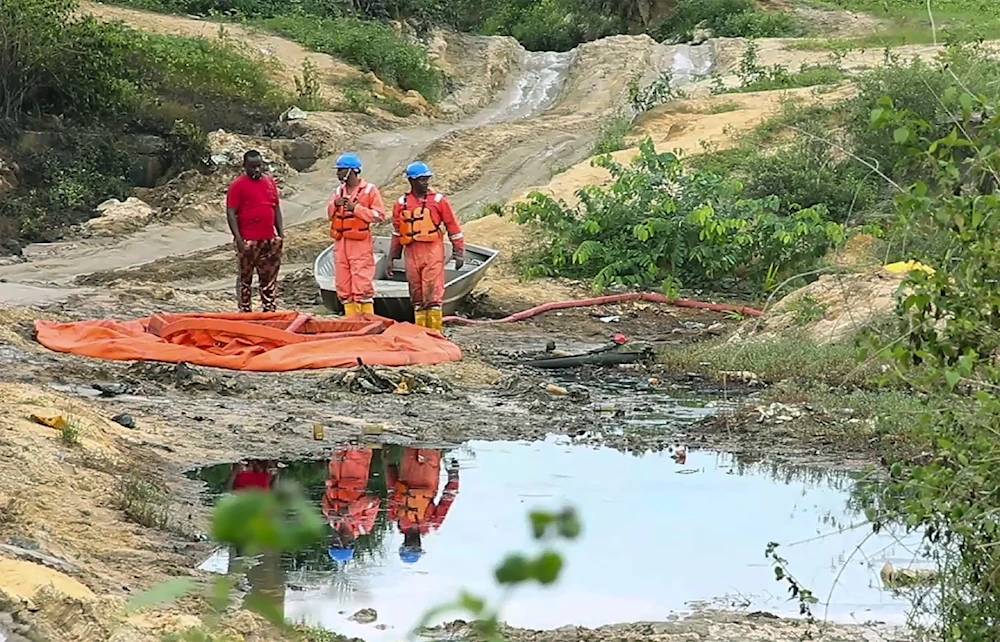Shell demanded to atone for toxic legacy of pollution in Niger Delta
Shell is informed that it is obligated to secure safe decommissioning of abandoned oil infrastructure.
-

In this grab taken from a video, workers stand by a container to collect oil spill waste from an oil spill at a Shell facility in Ogoniland, Nigeria, on June 16, 2023. (AP)
Shell must not be permitted to exit Niger Delta until it addresses its responsibility for the lasting environmental damage caused by pollution and safely dismantles abandoned oil infrastructure, a report warned.
While Shell is gearing up to divest from the region, the report from the Centre for Research on Multinational Corporations (Somo) emphasized the need for the company to fulfill its obligations to rectify historical pollution in the region. It accused Shell of attempting to evade accountability, despite profiting significantly from the oil industry.
🚨 @Shell is selling out the Niger Delta!
— SOMO (@SOMO) February 28, 2024
Our new report shows how historical pollution remains a serious issue and how Shell is evading responsibility for its toxic mess by selling its problem oil assets.
Read more👇 https://t.co/nyc75cAxW0
The concerns about Shell's potential evasion of environmental responsibilities and obligations in the Niger Delta were raised by Labour MP Clive Lewis in the House of Commons, amid accusations against the British company.
According to the report, there is a significant lack of transparency concerning funding for decommissioning in the Niger Delta. While Nigeria has legal requirements for companies to allocate funds for decommissioning, the report highlights the absence of a mechanism to verify the amount of funding companies have or haven't set aside. Researchers from Somo were unable to find any confirmation that Shell has established a fund or funds to address the decommissioning of the oil mining leases it has divested.
“Shell has pulled off the ultimate Houdini act,” said Audrey Gaughran, the executive director of Somo.
“As the oil industry enters its final phase, whether that’s in the next five years or 25, Shell has sold its toxic assets and will not be left holding them when the music stops," Gaughran stressed.
“Shell has profited from oil extraction for decades, and in doing so, has made the Niger delta one of the most oil-polluted places on Earth, leaving communities to face the dire consequences that will remain well beyond the lifetime of the industry,” she added.
Shell's withdrawal, having been the predominant operator with the largest presence in the region for decades, has far-reaching consequences for substantial areas of the Delta and numerous communities, according to the executive director of Somo.
“Under Nigerian law, Shell must clean up oil spills no matter the cause. It has failed to do so,” the report says.
Dive deeper
In the House of Commons this week, Lewis expressed concerns about Shell's plan to sell its Nigerian subsidiary, the Shell Petroleum Development Company (SPDC). He sought information on the government's actions to ensure the British company would not leave behind an environmental disaster.
“This is one of the most significant business and human rights issues of our generation. Shell is responsible for some of the most brutal, violent, and repressive actions by a company, in this case against communities in the Niger Delta,” Lewis said.
"Shell’s exit from the Niger Delta could set a precedent for other British multinationals operating in the global south that may be seeking to evade responsibility for environmental destruction, leaving communities with little recourse to justice,” he concluded.
It is worth noting that Africa's greatest economy is heavily reliant on the Niger Delta's oil resources for revenue, but pollution from that production has deprived communities of access to clean water, harmed farming and fishing, and increased the risk of violence, as per climate activists.
Hundreds of farmers and fishermen, deprived of their means of living, are adamant about the restoration of the environment and subsequent compensation.
Read more: Shell's climate-friendly venture is just a facade: The Guardian

 4 Min Read
4 Min Read








